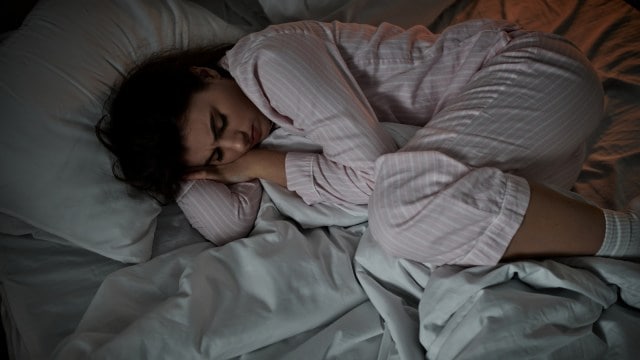📣 For more lifestyle news, click here to join our WhatsApp Channel and also follow us on Instagram
This is what happens to the body when you sleep for just 2 hours daily for a long time
Even a single night of extreme sleep loss can impair coordination and judgment, similar to mild alcohol intoxication.
 Long-term sleep deprivation increases the risk of hypertension, heart disease, diabetes, depression, and memory loss.
Long-term sleep deprivation increases the risk of hypertension, heart disease, diabetes, depression, and memory loss.In today’s fast-paced world, sleep deprivation has almost become the norm. Whether it’s binge-watching, doomscrolling, chasing a work deadline, finishing a science project, or simply lying awake overthinking, sleep is often the first thing to be tossed out of the window.
According to a 2025 sleep statistics report, about one-third of adults worldwide get less than the recommended seven hours of sleep per night. And even if we set aside the long-term consequences, the immediate effects are unavoidable with fatigue, poor concentration, and mood swings derailing an entire day.
Curious about just how damaging it can be to sleep for only two hours a night for a long time, we reached out to Dr Neetu Jain, Senior Consultant, Pulmonology, Critical Care and Sleep Medicine, PSRI Hospital, to understand what really happens to the brain and body when rest becomes a luxury.
1) What are the immediate effects on the brain and body when a person sleeps only two hours a night?
“Sleeping only two hours a night severely disrupts the brain’s ability to function,” says Dr Jain. She explains that the most immediate effects include fatigue, poor concentration, slower reaction time, and irritability. According to her, “the brain struggles to process information efficiently, leading to lapses in memory and focus.” Physically, she adds, “the body experiences hormonal imbalance — cortisol levels rise, increasing stress, while immunity weakens.” She further cautions that “even a single night of extreme sleep loss can impair coordination and judgment, similar to mild alcohol intoxication.”
 Most immediate effects include fatigue, poor concentration, slower reaction time, and irritability.
Most immediate effects include fatigue, poor concentration, slower reaction time, and irritability.
2) What changes occur in emotional regulation and decision-making when the brain is consistently sleep-deprived?
Dr Jain explains that “chronic sleep deprivation reduces activity in the prefrontal cortex — the part responsible for logic, judgment, and impulse control — while overstimulating the amygdala, which controls emotions like anger and fear.” As a result, she says, “people become more emotionally reactive, anxious, and prone to mood swings.” She adds that “their decision-making becomes impulsive, and they find it harder to manage conflicts or stress calmly.”
3) How quickly can sleep loss start to show visible effects — like dull skin, dark circles, or weight fluctuations?
“Visible signs of sleep deprivation can appear within just a few days,” Dr Jain says. She explains that “the skin becomes dull as collagen production decreases, and blood vessels under the eyes become more prominent, causing dark circles.” She adds that “hormonal imbalances can also lead to weight fluctuations, as sleep deprivation increases hunger hormones (ghrelin) and decreases satiety hormones (leptin), leading to overeating.”
4) What are the long-term risks for the heart, brain, and mental health if someone continues this pattern?
Dr Jain cautions that long-term sleep deprivation increases the risk of hypertension, heart disease, diabetes, depression, and memory loss. She explains that “the brain’s ability to clear toxins diminishes, which may contribute to cognitive decline and increase the risk of neurodegenerative disorders like Alzheimer’s.” According to her, “chronic lack of sleep also weakens emotional resilience and raises the risk of anxiety and burnout.”
 Sleep deprivation increases hunger hormones (ghrelin) and decreases satiety hormones (leptin), leading to overeating.
Sleep deprivation increases hunger hormones (ghrelin) and decreases satiety hormones (leptin), leading to overeating.
5) If a person has no option but to sleep for very short durations, are there any ways to minimise the damage temporarily?
“Short power naps of 20–30 minutes, hydration, balanced meals, and exposure to natural light can help sustain alertness temporarily,” Dr Jain says. However, she emphasises, “these are only stop-gap measures — they cannot replace proper sleep.”
6) If a person has been sleeping for only two hours a day for very long, what steps can they take to control the damage?
Dr Jain advises that “they should gradually extend sleep duration by 30–60 minutes daily, maintain a consistent bedtime, and avoid caffeine or screens before bed.” She adds, “if recovery sleep doesn’t improve alertness or mood, consulting a sleep specialist is essential to assess underlying issues and repair long-term damage.”
DISCLAIMER: This article is based on information from the public domain and/or the experts we spoke to. Always consult your health practitioner before starting any routine.
📣 For more lifestyle news, click here to join our WhatsApp Channel and also follow us on Instagram
- 01
- 02
- 03
- 04
- 05



























